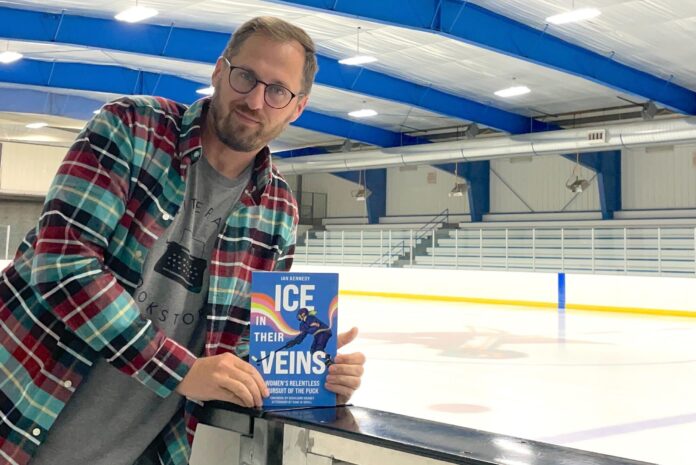

Despite the increase in popularity within women’s hockey with the emergence of the Professional Women’s Hockey League (PWHL), strong obstacles remain in the way of athletes finding success in the sport.
On Oct. 29 Ian Kennedy, the women’s hockey manager and editor for the Hockey News, will be releasing his new book titled Ice in Their Veins: Women’s Relentless Pursuit of the Puck.
“I realized that there was just a plethora of incredible people that have never been recognized and that did so much to build hockey to where it is today,” said Kennedy.
This book is released around a month before the face-off for the first game in the second season of the PWHL. According to Kennedy, the first season was a massive step forward for the growth of women’s hockey.
“I think by all metrics it outperformed expectations in year one, selling out buildings left and right, breaking pretty much every attendance record that there was for women’s professional hockey in Canada and the United States,” said Kennedy.
The idea for the book came about when Kennedy was working on his first book and he came across a story about Marion Coveny, the first captain of a national women’s hockey team in 1987.
Kennedy discovered that she was actually from his small hometown of Wallaceburg, Ontario. He was shocked that he stumbled across this information from doing his own independent research.
“I’d never heard of her before in my life and I thought that if it was a man, we’d have an arena named after her, we’d have a sign entering our town recognizing her and she’d probably be in the Hockey Hall of Fame,” said Kennedy.
As he looked into Coveny’s story, Kennedy said that he learned about stories of other players. He slowly heard all of these incredible stories that he’s been “collecting for years.”
More stories in the book include that of Fran Rider, one of the driving forces behind the growth of women’s hockey over the past 30 years, Kelly Dyer, a goalie for Team USA in some of the first women’s World Championships and Bev Beaver, an Indigenous hockey player who had to dress up like a boy to be able to step on the ice.
“Everybody had a really unique story. They all had very similar challenges along the way that presented themselves in different formats,” said Kennedy. “This book really tells the history through the individual stories and individual eyes of the people that lived it.”
Kennedy noted that he views himself as a “story preservationist” instead of a storyteller when it comes to this book, understanding the importance of carrying the weight of writing people’s recollections of their histories and their feelings about it.
“I think a really important part of this is humanizing the issues that did exist and still exist today, that have barred women and girls from the sport,” said Kennedy.
When speaking about young women trying to find success in hockey, specifically those at the U Sports level, Kennedy notes that there are still plenty of challenges to overcome.
“There’s 100 per cent work to do and problems to be solved, but the opportunities are beginning to open,” said Kennedy. “I would say, just keep playing and know that there are people out here that believe in you and value the efforts that every woman and girl are making.”
“This book is their story too … I’m really excited to see the women that are playing the game right now write the next chapter,” said Kennedy.
